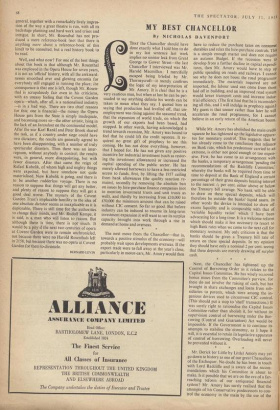II Catalogo Questo
'THERE are people,' said Corno di Bassetto, 'who will read about music and nothing else. To them dead prima donnas are more interesting than saints. . . .' These people, for the mere seventy-five shillings that Mr. Harold Rosenthal's book costs, can die happy. There are 671 pages of text; there is an Appendix, 125 pages long, listing every opera that has ever been sung there, season by season, naming every artist in every cast and every conductor of every performance. There is a 42-page index. There are as many pages as Don Giovanni had conquests. (Did you know that no resident company has performed Don Giovanni at Covent Garden for twenty years? No, of course you didn't, but Mr. Rosenthal does, and 1 hope, now that you know, you think it as big a scandal as I do.) There are forty-nine pages of photographs, there are fifty-five million facts (and they are all accurate, never fear). There is scholarship in- formed by love, learning lightened by opinion, and history with life breathed into its dry bones. Seven years Mr. Rosenthal, as archivist of the Opera House, laboured over his task, and beside his monumental achievement the seven years that Esau toiled for Laban seem but a fleeting moment. The writing of this book would have induced a nervous breakdown in an elephant, but I saw Mr. Rosenthal at the opera only the other night, and his eyes were gleaming brightly behind his gig- lamps.
It must not be supposed, though, that the book is a mere lifeless catalogue. Mr. Rosenthal clearly conceived it as his duty to leave nothing out, to make his history exhaustive. But the result is far from being exhausting. The one-adjective-per- singer summary of a production, when repeated several hundred times, is apt to become a little wearing, but something of the kind is inevitable. And Mr. Rosenthal does manage to convey not only the facts of what has happened at the three opera houses that have stood in Covent Garden in the last two centuries, but also, in a remarkable manner, the spirit of what has happened there. The reader gets from his pages an understanding of the changes in taste and musical fashions and indeed of the development of dramatic music in general, together with a remarkably lively impres- sion of the way a great theatre is run, with all its backstage planning and hard work and crises and intrigue. In short, Mr. Rosenthal has not pro- duced a mere reference-book (not that there is anything mere about a reference-book of this kind) to be consulted, but a real history book to be read.
Well, and what now? For one of the best things about this book is that although Mr. Rosenthal was employed in the Opera House for seven years, it is not an 'official' history, with all the awkward- nesses smoothed over and glowing encomia for everybody still engaged in running the place; ihe consequence is that one is left, though Mr. Rosen- thal is scrupulously fair even in his criticisms, with an uneasy feeling that the Covent Garden opera—which, after all, is a nationalised industry —is in a bad way. There are two chief reasons for this; one is financial—the money the Opera House gets from the State is simply inadequate, and becoming more so—the other artistic, lying in the lack of an Intendant on the continental model. After the war Karl Rankl and Peter Brook shared the task, as if a country under siege could have two dictators; the results are generally agreed to have been disappointing, with a number of truly spectacular disasters. Then there was an inter- regnum, without anybody in control; the results were, in general, more disappointing, but with fewer disasters. After that came the reign of Rafael Kubelik, of whom high and mighty things were expected, but have somehow not quite materialised. Now Kubelik is going, and there is to be another rudderless voyage. There is no reason to suppose that things will get any better, and plenty of reason to suppose they will get a good deal worse. The mystery of the Covent Garden Trust's implacable hostility to the idea of one absolute dictator seems as inexplicable as it is deplorable. There is still time for the authorities to change their minds, and Mr. Rudolf Kempe, it is said, is a man who will listen to reason. But although there is time, there is not much. It would be a pity if the next two centuries of opera at Covent Garden were to remain unchronicled, not because there were no Harold Rosenthals left in 2158, but because there was no opera at Covent Garden for them to chronicle.
BERNARD LEVIN



































 Previous page
Previous page